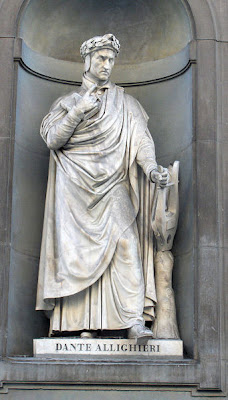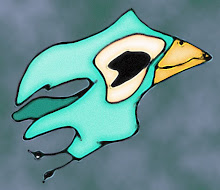
RS: What was your general mindset, being forced to live in exile from Florence, your home, during the initial stages of the Comedy?
DA: No, no, you don’t understand. I didn’t— uh, wait... what is that?
[Distracted, Dante has shifted gears, and leaves the question unanswered. I follow Dante’s stare, which seems to end with an object on my writing desk.]
RS: That? A stapler. They’re used to affix pages of a document, so they stay together. So, what was your mindset when—
DA (interrupting): I refer to the book next to it.
RS: Oh, the book... it’s poetry. Some stuff by Yusef Komunyakaa. I just finished it.
DA: A book written by a moor? Fah. I know of Africa. I can’t imagine what ‘stuff’ such a book could exhibit.
[This statement catches me so off guard that I don’t know how to respond for a moment.]
RS: Uh... if by 'moor' you mean a black person, then yes. He’s black.
[Dante then lets out a curt snort and rolls his eyes.]
DA: And what did you think of ‘moorish verse’, then?
RS: I liked the book, but listen: You should know that the current state of our world is that all men are created equal, to quote a well-known phrase. These times aren’t nearly so racist as the time in which you lived. Here, the color of skin doesn’t dictate much of anything but just that. Yusef is a professor and academic, as well as a war veteran.
DA: Anyone can be an academic, or a war veteran for that matter. You just have to live through something.
RS: I don’t think we’re making much progress with this interview. I really think we should get back to the questions.
[Dante then notices a poster of Li Young Lee on the wall of my library and chuckles.]
DA: Well, there’s progress for you. Moorish verse and Asian intellect. God save you.
RS: Okay, I’m trying to be objective about this, but you’re kind of offending me. Also, no one says ‘moor’ anymore. Can we keep to the questions I prepared?
DA (sighing): Oh, ask.
RS: Thank you. Now, history shows you had a long-time friendship with fellow writer Guido Cavalcanti, a poet of much skill. How do you feel your own writing was affected by this friendship?
DA: Oh hell. Interview Guido if you like him so much.
RS: Then is history wrong in assuming the two of you were close?
DA: Close? He was always around, to some extent, but I wouldn’t say we spent a lot of time together. It was more like an annual event, we meeting, and most to learn from Lacini, who was just on fire at times.
RS: Brunetto Lacini. You speak of Dolce Stil Novo *1.
DA: Yeah, but we didn’t call it that. It was me, Guido, Lapo Gianni, and Cino da Pistoia. And of course, Brunetto. We all discussed verse here and there, but more discussed Guelph matters, and of course, young women. As for Guido being a ‘poet of much skill’, I can’t agree. Guido was a master of one thing, and that one thing only: What you in your vernacular would call ‘cock-blocking’.
(Interviewers note: Dante states ‘cock-blocking’ in English.)
RS: Are you being serious?
DA: I’d be talking to a nice, mellow girl, you know, of substance and good breeding, just talking, and then Guido would saunter over in a puffed-up manner, really trying to show off his large arms and all that, and he’d start picking at me, or any other man, to try and get the girl’s favor. He’d even do it when you were talking with your own wife. It was annoying, but I still met with him from time to time because I thought he understood my fervor for a particular girl in town, Beatrice. You know, he was a sort of confidant, I suppose. He knew about me and was always curious to know more. But more a confidant than than a friend.
RS: The girl you refer to is Beatrice Portinari.
DA: Totally. I focused my Vita Nuova on her, or really, around her. That was the largest portion of our relationship, the ever-hanging favor I had for her, but never really moved on. When she died, it hurtled me out of my body for some time. I didn’t know what to do, so I descended into study. Kept myself occupied.
RS: How did Guido feel about your unfulfilled attraction to Beatrice?
DA: Oh, he thought it was great. You know, muses and all. We were sort of new to it all. But Guido and I stopped getting along after awhile. I got pretty heated one night because of his habit of using metaphors about smallness whenever he spoke of or about me, and it just started to agitate me. I got really angry when he asked if I had begun a new enorme piccolo book, which was his way of saying my work was large but of little consequence. I challenged him to a fight, but he wouldn’t consent because we were drunk. It’s just as well, because he was much larger than me, anyway. I was just tired of everything. The politics of Florence at the time, where I lived, were simply twisting this way and that, and there was going to be trouble. It was a phase, and I was in one too.
RS: Beatrice was married for the majority of your knowing her. Did you feel odd about having such strong feelings for a married woman?
DA: No. I was married, too. Had a handful of kids. That’s why I never acted on anything. But so what? I liked her anyway. So, she was yoked. Big deal. You’ve never been attracted to a woman that was married?
RS: ‘Yoked’... That’s interesting parlance.
DA (whiny): Blah. That’s interesting parlance.
[It seems my interviewee has adopted a whiny voice and is now mimicking me, in the manner of a playground juvenile.]
RS: Let’s get back to your Comedy.
DA (acting as if he is mentally challenged): Let’s get back to your Comedy.
RS: Man, I can’t conduct this interview if you don’t cooperate with me.
DA (snotty): Man, I can’t conduct the bleh bleah bleah stupid ass blah blah with me.
RS: ...
DA: ...
RS: Are you finished?
DA: You’re boring me. Get on with it. This room smells.
RS: Okay, back to the Comedy.
DA: It’s not funny in your sense of the word ‘Comedy’.
RS: Yes, I know.
DA: And I didn’t write it, either.
RS: ...What?
DA: I didn’t write The Divine Comedy.
RS: Wait... I don’t understand.
DA: Beatrice wrote it. I let her use me as the main.
RS: You’re telling me that you, Dante, did not write The Divine Comedy of Dante?
DA: I’d never write something like that. It was so full of itself and just loooooooooooooong.
RS: You do realize that the last near-thousand years of history has you pegged as the author of Dante’s Divine Comedy, right?
DA: Yeah, I’m not an idiot. But there’s nothing I can do about it now. Beatrice was really vain, see. Oh, she was amazing-looking, yes, but definitely full of herself. Just like her Divine Comedy of mine. Want to know something weird? She wanted me to ‘stalk’ her, you know? Call to her in alleys and that sort of low thing. But I wasn’t into it. It was weird. Especially in the 1200s. Like I said, I had my own family by then. I mean, creeping around behind some pretty girl, in those days... well, you could get a sword in the gut for that one, especially once the Black Guelphs started gaining power.
RS: Listen, I think you’re making this up. You are the author of The Divine Comedy. You have to be. And you already told me you were into Beatrice Portinari, so your statement that Beatrice wanted you to stalk her makes no sense. There’s truckloads of history that contradict you, here.
DA: Whatever you say. I sense you’re the sort of man who believes what he reads, yet reads low.
RS: I don’t know by what standard you use the term ‘low’.
DA: Maybe you comprise a self-absorbed and simple ignorance, like that of, say, a half-dead cow?
RS: All right. Out.
DA: Hmm?
RS: Get out. We’re done.
DA: Just as well. You’re a primitive, if you ask me.
RS: I’m not asking you anything. I’m telling you to get out.
DA: Or maybe just a savage. You probably became one from a saturation of ‘created-equal’ verse.
RS: OUT!
[Dante stands and stretches, slowly, as if he in no way is bothered by my terminating the interview or yelling at him. When I ask for my microphone back, he removes it and throws it over by my window, mutters ‘Andare a letto con animali*2’, and slowly makes his way out of my room and house. Once he reaches my driveway, he simply vanishes back into the ether, having walked too far away for me to maintain the psycho-physical link.]
*1: Translated – ‘The Sweet, New Style’
*2: Translated - ‘Go and sleep with animals’.

No comments:
Post a Comment